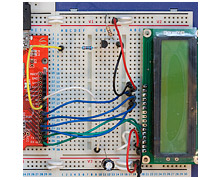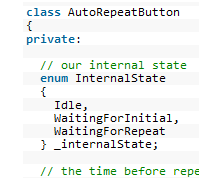This article will present a circuit and accompanying source code that you can use to control the backlight and contrast functions of an HD44780-compatible LCD. Controlling these functions from software allows you to cut down on external components such as dials, saving you space and...
Debounced buttons with auto-repeat in AVR C++
posted by Andy
This article presents a C++ class that implements an auto-repeat button. An auto-repeat button behaves like a key on a keyboard. That is, it fires first when you press it and then repeatedly when you hold it down. The class allows you to configure the length of time that the button waits...
Debouncing buttons in AVR C++
posted by Andy
On the face of it, reading the open/closed state of a button should be straightforward. You would just wire up the button circuit and tap the current flow into one of the Arduino digital pins configured for input. Unfortunately you will soon discover that it’s just not that simple. At...
An ATtiny85 development environment
posted by Andy
This article will help you to set up a low-cost development environment for programming and testing the ATtiny 85 MCU. The same principles apply to any other member of the ATtiny family that can run free of any external components. Parts List Component Supplier Price...
USBasp drivers for 64 bit Windows 7
posted by Andy
The most cost-effective way to program an ATmega/ATtiny MCU that’s not embedded in a development board such as the Arduino is to buy yourself a USB in-system programmer (ISP). There are dozens available on ebay for just a few pounds, and that’s where I got mine. Unfortunately when...
An introduction to the ATtiny85/45/25
posted by Andy
The ATtiny range of microcontrollers are ATmel’s smallest and lowest power 8-bit AVR offerings. Typically they come with between 1K and 16K of program memory and 512 bytes of SRAM and 512 bytes of EEPROM. These MCUs are entirely self-contained. All they need is a stable power supply,...
avr-gcc 4.5.1 and avr-libc 1.7.0 for windows
posted by Andy
Deprecated! This has now been superceded by gcc-4.7.0 and avr-libc 1.8.0. Click here to go to my article that describes how to upgrade. The version of gcc included with WinAVR-20100110 is 4.3.3. If you’d like to update to avr-gcc 4.5.1 with avr-libc 1.7.0 then you’ve come to...
Your first AVR project in Eclipse
posted by Andy
So you’ve read my blog post Setting up Eclipse for AVR projects and now you want to write some code but you’re somewhat bewildered by all the Eclipse options. Well not to worry, I’ll walk you through your first project step-by-step. We’ll go ahead and recreate the...








